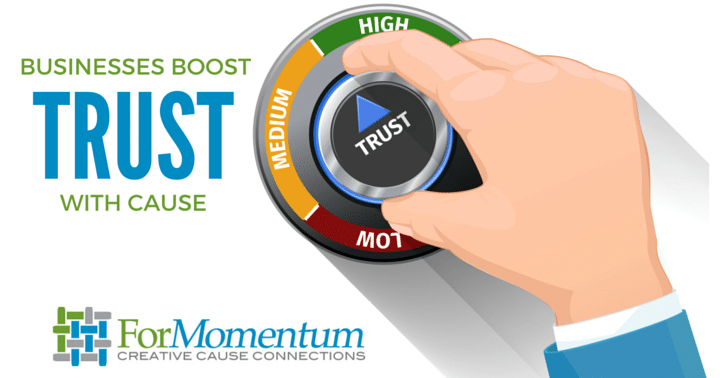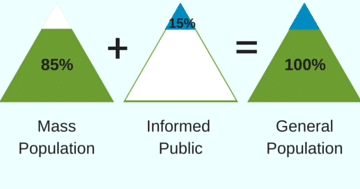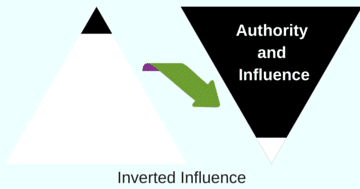
By: Rich Maiore, Vice President, For Momentum
Recently updated research helps us connect the dots between consumer trust and cause. For their 2016 Trust Barometer, Edelman asked more than 33,000 people worldwide how much they trusted four institutions: non-governmental organizations (NGOs), businesses, media outlets and government agencies. Trust in all these institutions seems to have rebounded from the Great Recession of 2008. One explanation for the increase in trust, especially for businesses, is the goodwill generated by their association with cause.
The Barometer findings show that consumers expect companies to lead social change. Eighty percent of respondents agreed with the following statement:
“A company can take specific actions that both increase profits and improve the economic and social conditions in the community where it operates.”
Research shows that public trust in CEOs has increased in the past five years, especially for those business leaders who demonstrate a commitment to both earning profits and contributing to society. In the Executive Summary, Edelman names Paul Polman of Unilever (environment), Howard Schultz of Starbucks (youth employment), Cyrus Mistry of Tata (education) and Jack Ma of Alibaba (inclusion) as examples of CEOs who are leading social change.
 The correlation between public trust and cause becomes even more significant when you examine a couple of other insights from the 2016 Edelman Trust Barometer. In the 16 years that Edelman has been researching trust, they’ve seen a widening gap in trust between what they call the “Informed Public,” which constitutes about 15 percent of those surveyed, and the “Mass Population,” which represents the other 85 percent of the survey’s “General Population.” Members of the “Informed Public” group are ages 25-64, are college educated and report household income that falls within the top 25 percent of their age group in each country. They also consume more business and public policy news than their “Mass Population” counterparts. Edelman found that the “Informed Public” is overall more trusting and has a more optimistic view of life over the next five years. The trust levels and optimism of the “Mass Population” shows little signs of improvement.
The correlation between public trust and cause becomes even more significant when you examine a couple of other insights from the 2016 Edelman Trust Barometer. In the 16 years that Edelman has been researching trust, they’ve seen a widening gap in trust between what they call the “Informed Public,” which constitutes about 15 percent of those surveyed, and the “Mass Population,” which represents the other 85 percent of the survey’s “General Population.” Members of the “Informed Public” group are ages 25-64, are college educated and report household income that falls within the top 25 percent of their age group in each country. They also consume more business and public policy news than their “Mass Population” counterparts. Edelman found that the “Informed Public” is overall more trusting and has a more optimistic view of life over the next five years. The trust levels and optimism of the “Mass Population” shows little signs of improvement.
 Edelman says its trust data has big implications when you consider that the traditional Pyramid of Influence has changed dramatically. In the past, authority and influence started at the top and trickled down to the masses. The most recent Trust Barometer shows that influence has shifted to the masses. The top influencers are no longer executives, academics and media–it’s peers, friends and family. The most influential online source of information is the search engine, followed closely by television and social media. That means businesses must continue to find ways to engage their customers at a peer-to-peer, word-of-mouth level. They must search for opportunities to communicate that they are serving consumers not just through their products and services, but through their responsible business practices and through programs that give back to their communities.
Edelman says its trust data has big implications when you consider that the traditional Pyramid of Influence has changed dramatically. In the past, authority and influence started at the top and trickled down to the masses. The most recent Trust Barometer shows that influence has shifted to the masses. The top influencers are no longer executives, academics and media–it’s peers, friends and family. The most influential online source of information is the search engine, followed closely by television and social media. That means businesses must continue to find ways to engage their customers at a peer-to-peer, word-of-mouth level. They must search for opportunities to communicate that they are serving consumers not just through their products and services, but through their responsible business practices and through programs that give back to their communities.
The 2016 Edelman Trust Barometer is a fascinating read. Ultimately, it confirms trends that many of us who have been in corporate social responsibility (CSR) have been seeing for some time. Companies can and must boost consumer trust by thoughtfully connecting their business plans to cause. Email me if you’re ready to create or optimize a CSR program that grows your business and fosters consumer trust.

[…] Will Help: To make a strong argument for cause marketing, check out For Momentum’s recent post on how consumer trust is strongly linked to a company’s association with a good […]